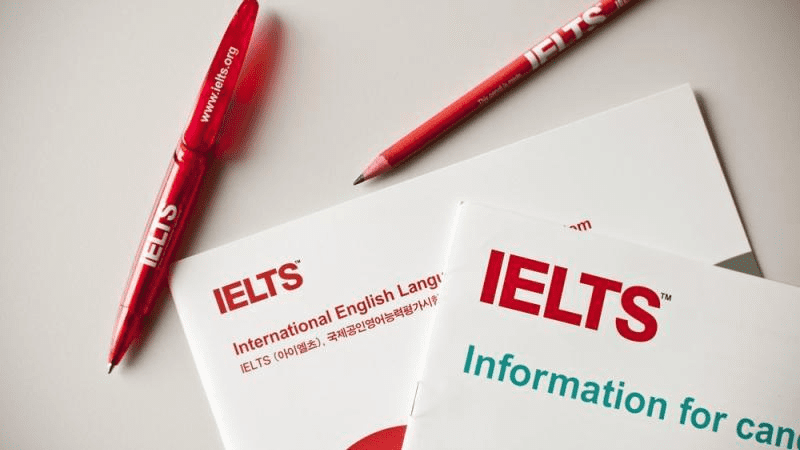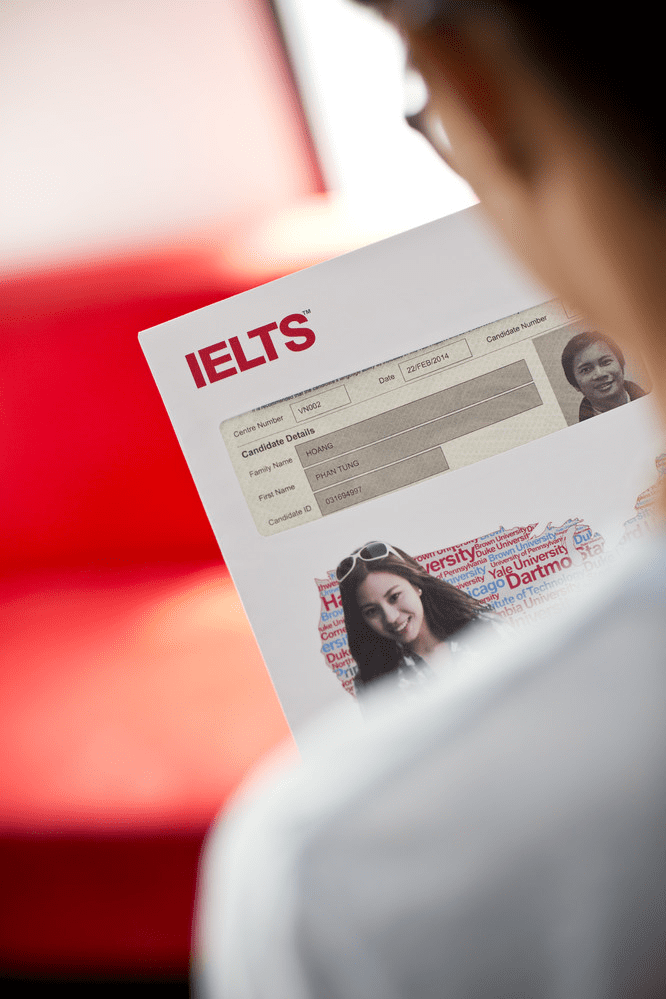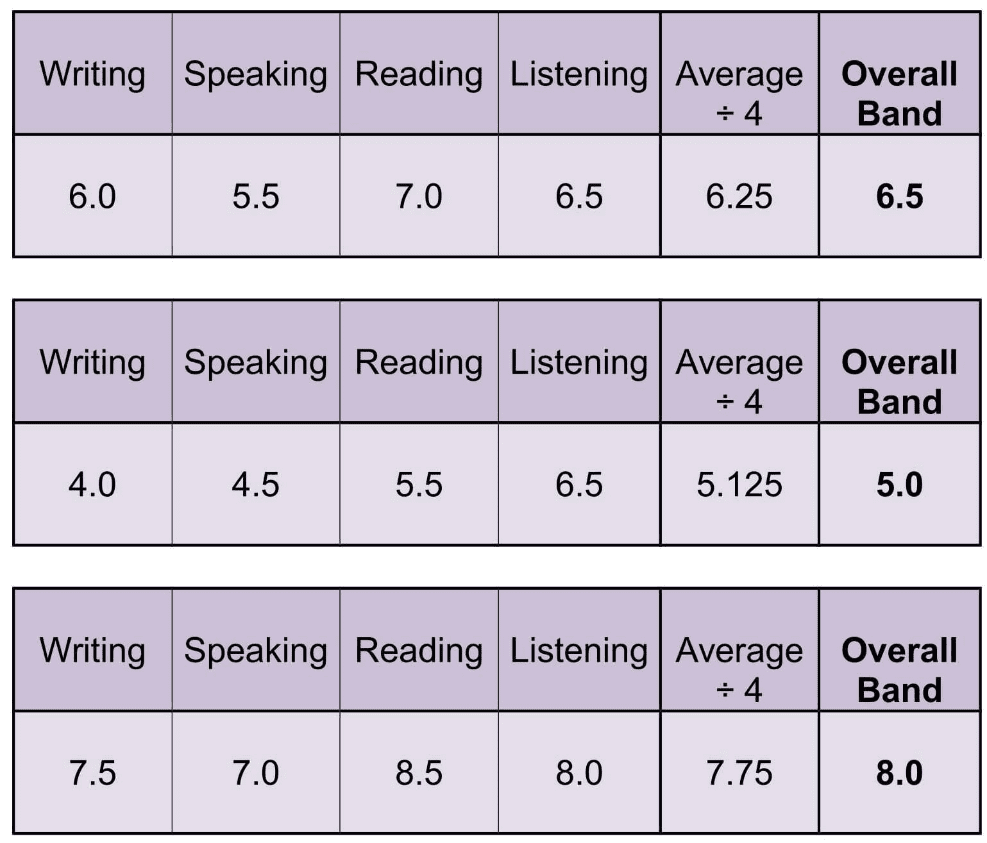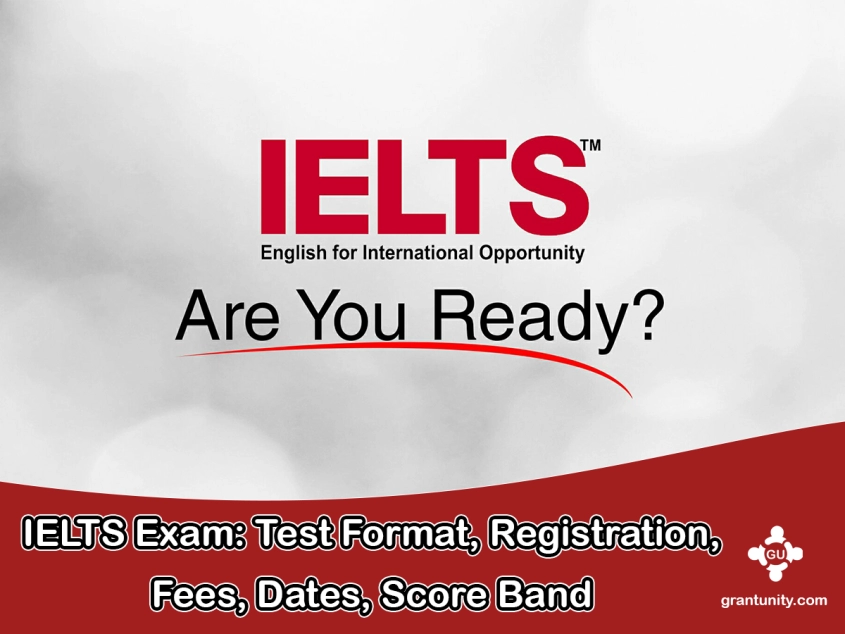IELTS Exam: Test Format, Registration, Fees, Dates, Score Band
International English Language Testing System (IELTS) is a globally acknowledged assessment tool specifically crafted to measure the proficiency of individuals in the English language. This standardized test is meticulously designed to evaluate the linguistic abilities of candidates aspiring to pursue education or employment opportunities in environments where English is the principal medium of communication.
As a testament to its widespread recognition, IELTS is accepted by numerous academic institutions, employers, and immigration authorities worldwide. The significance of IELTS lies in its capacity to provide a comprehensive and standardized evaluation of an individual’s language skills, ensuring that they possess the necessary linguistic competence to navigate successfully in English-speaking academic, professional, or social contexts.
For those aspiring to embark on academic journeys, the Academic Module of IELTS is tailored to assess skills relevant to university-level studies. This includes tasks that gauge the ability to comprehend complex academic texts, articulate well-structured responses, and engage in intellectual discussions, thereby ensuring that candidates are well-prepared for the language demands of higher education.
On the other hand, the General Training Module of IELTS is designed to evaluate the practical, everyday language skills of individuals seeking employment or training opportunities in English-speaking countries. This module assesses a candidate’s capability to understand and convey information in a workplace or social setting, emphasizing the linguistic aptitude required for effective communication in practical, real-world scenarios.
IELTS’s holistic approach is valuable, encompassing four key language skills – listening, reading, writing, and speaking. The listening section evaluates the ability to comprehend spoken English across various contexts, while the reading section assesses the capacity to interpret and analyze diverse written materials. The writing component gauges the candidate’s ability to present coherent written arguments and express ideas clearly, while the speaking section evaluates oral communication skills through face-to-face interviews.

IELTS Overview
| Exam Name | IELTS |
| Conducting Authorities | British Council and IDP Education |
| Registration Fees | 250 USD |
| Band Score Scale | Band-1 (lowest) to Band-9 (highest) |
| Exam Duration | Studying abroad and immigrant to English-speaking countries |
| Sections | Listening, Reading, Writing, and Speaking |
| Exam Modes | Paper-based and Computer-delivered |
| IELTS Types | Academic and General Training |
| Result Validity | 2 years |
| Applicable for | Two years |
Why is IELTS important?
During the application process, students often doubt the significance of IELTS performance. Here’s the situation:
In order to achieve academic and professional success in English-speaking countries, it is necessary for applicants to show a high level of competence in the language to both the university and the visa-granting authorities. The results of the language proficiency test help them to evaluate the candidate’s ability to use the language effectively in different real-life situations.
The International English Language Testing System (IELTS) is widely accepted and recognized as a requirement for admission to universities and colleges in English-speaking countries. Over 3,400 institutions in the USA and all universities and colleges in the UK, Australia, and other countries acknowledge the test. Moreover, the majority of universities and colleges in Canada, New Zealand, Ireland, and many other nations acknowledge the test.
The International English Language Testing System (IELTS) is a commonly used test for visa and citizenship applications in Australia, the UK, Canada, and New Zealand. It is widely accessible to candidates available at over 1600 locations in more than 140 countries and territories. In India, over 80 IELTS test centers are scattered across various cities where you can reserve a spot to take the test. Due to its widespread acceptance and simplicity, IELTS is the most widely used English proficiency test for international higher education and migration.
IELTS Exam Pattern and Syllabus
The IELTS exam is divided into four sections: listening, reading, writing, and speaking. The exam format is designed to evaluate different skill areas. It takes 2 hours and 45 minutes to complete, with varying amounts of time for each section. The listening, reading, and writing sections are taken on the same day without any breaks in between. The speaking test can be taken on the same day as the other tests or up to a week before or after, depending on the center’s recommendation.
The scores attained in each section are averaged to calculate the overall band score. Each section is evaluated separately based on a predetermined standard format, ensuring fairness and accuracy in the assessment of each candidate. Let’s look closely at each section to better understand the exam format.
Listening Section
Duration: 30 minutes
No. of questions: 40
Question type(s): Multiple choice, Sentence completion, Summary completion, Flow-chart completion, Diagram labeling, Matching information, and more.
Skills tested:
-The ability to follow a conversation between two people
-The ability to listen for concrete facts, such as places, prices, or times
-Detailed understanding of specific points or an overall understanding of the main points of the listening text
Reading Section
Duration: 60 minutes
No. of questions: 40
Question type(s): Short answer, Matching headings, Multiple choice, Sentence completion, Summary completion, Flow-chart completion, Diagram labeling, Identifying writer’s views/claims, and more.
Skills tested:
-The ability to understand the author’s opinions or ideas
-The ability to scan for specific information
-The ability to recognize the main idea or theme in the paragraphs or sections of a text
Writing Section
Duration: 60 minutes
No. of questions: 2
Question type(s):
Writing Task-1:
Write an essay of at least 150 words summarising the information presented on a related topic in the given graphs, table, or diagrams. Students are advised to spend no more than 20 minutes on this task.
Writing Task-2:
Write a clear and relevant essay of at least 250 words in response to the given argument, point of view, or problem. The style of writing should be academic and neutral. Students are advised to spend no more than 40 minutes on this task.
Note: Writing Task-2 contributes twice as much as Task-1 to the final Writing band score.
Skills tested:
-The ability to give a well-organized summary of the most important and relevant information and trends
-The ability to present a clear, rational, and well-organized academic argument to the topic/issue provided
-Grammatical range and accuracy
Speaking Section
Duration: 15 minutes
No. of parts: 3
Question type(s):
Part 1:
This part is generally about the introduction and interview, and the questions related to familiar topics like home, studies, work, and interests are asked.
Part 2:
The test-takers are given a card with the topic to speak on for 2 minutes. The examiner can ask 1 to 2 follow-up questions on the same topic. After the topic is given, the test takers are given a minute to prepare and paper and pencil to make notes for the same.
Part 3:
In this part, the examiner and test taker discuss issues related to the topic given in Part 2 more abstractly and in greater depth.
Skills tested:
-The ability to communicate opinions and information on everyday topics and situations
-The ability to speak at length on a given topic, using appropriate language while organizing the ideas coherently
IELTS Test Types
According to a candidate’s needs and goals for traveling abroad, the IELTS is divided into Academic tests and General training. Additionally, there are two different IELTS test formats based on how the test is administered: paper-based and computer-delivered. Check out the comparison of each section’s presentation below to determine which IELTS registration might be best for you:
Academic Test and General Training
- Academic IELTS:
- Purpose: This version is intended for individuals applying for higher education or professional registration in an English-speaking academic environment. It is commonly required for university admissions or for those seeking professional registration in fields like medicine or law.
- Reading and Writing Tasks: Academic IELTS includes texts and tasks that are more suited to an academic setting. For example, the reading passages may be more complex, and the writing tasks may involve describing and analyzing data, processes, and diagrams.
- General Training IELTS:
- Purpose: This version is typically for those who are migrating to English-speaking countries for secondary education, work experience, or training programs. It is also often required for immigration purposes.
- Reading and Writing Tasks: General Training IELTS includes texts and tasks that are more related to everyday life and work situations. For instance, the reading passages may include advertisements or job descriptions, and the writing tasks may involve writing a letter or an essay about familiar topics.
While the Reading and Writing sections differ in content, the Listening and Speaking sections are the same for both Academic and General Training IELTS. The Listening section assesses your ability to understand spoken English, while the Speaking section evaluates your ability to communicate effectively in spoken English.
It’s crucial for test-takers to determine which version of the IELTS test is appropriate for their specific goals and needs. If you are unsure which version to take, it is advisable to check the requirements of the institution or organization to which you are applying.
Paper-based and Computer-delivered
Paper-Based IELTS:
- Test Format:
- The test is conducted using a physical question booklet and answer sheet.
- The Listening, Reading, and Writing sections are completed on paper.
- Listening Section:
- Test-takers listen to recordings through speakers.
- Answers are recorded on the question booklet and transferred to the answer sheet during the allocated transfer time.
- Reading Section:
- The Reading section consists of three texts with a variety of question types.
- Answers are recorded on the answer sheet.
- Writing Section:
- Test-takers write their responses on the question booklet.
- Handwritten essays are submitted for assessment.
- Speaking Section:
- The Speaking test is conducted face-to-face with an examiner.
- It is a separate session, usually scheduled on the same day as the other three sections.
- Test Result Delivery:
- Test results for the paper-based IELTS are typically available 13 calendar days after the test date.
- Test takers receive a Test Report Form (TRF) by mail, which includes individual band scores for each section (Listening, Reading, Writing, and Speaking) and an overall band score.
Computer-Delivered IELTS:
- Test Format:
- The test is taken on a computer in a dedicated test center.
- The Listening, Reading, and Writing sections are completed on the computer.
- Listening Section:
- Test-takers listen to recordings through headphones.
- Answers are typed directly on the computer.
- Reading Section:
- The Reading section is presented on the computer screen, and questions are answered by selecting options using the mouse.
- Writing Section:
- Test-takers type their responses directly on the computer.
- Essays are submitted electronically for assessment.
- Speaking Section:
- The Speaking test is still conducted face-to-face with an examiner.
- It is a separate session, usually scheduled on the same day or within a week of the other sections.
- Test Result Delivery:
- Test results for the computer-delivered IELTS are generally available within 3 to 5 calendar days after the test date.
- Test-takers can view their results online through the British Council’s online portal.
Both versions of the IELTS test aim to evaluate candidates’ proficiency in four language skills, namely Listening, Reading, Writing, and Speaking. The choice between paper-based and computer-delivered tests is usually based on personal preferences and the availability of test centers offering the preferred format. It is essential for test-takers to practice in the format they intend to take to familiarize themselves with the specific requirements of that version.

During the computer-based test, questions will be displayed on the screen, and answers will be entered using a mouse and keyboard.

Which IELTS test to choose?
The content, difficulty level, format, and structure of the IELTS test remain consistent, whether taken in the traditional paper-based format or the computer-delivered mode, as mentioned earlier. The sole distinction lies in the mode of examination.
Opting for the paper-based test might be more suitable if you have a preference for the conventional pen-and-paper approach to examinations. However, candidates should be mindful of the limited availability of paper-based tests and, consequently, are advised to proactively register with IELTS and secure their preferred test date at least one month in advance to ensure availability.
Conversely, the computer-delivered IELTS is a viable choice if the medium of the test does not pose a concern for you or if you are comfortable with the computerized testing environment. Additionally, choosing the computer-delivered option may be advantageous if you seek prompt test results or encounter challenges in scheduling a paper-based test. It provides greater flexibility and a faster turnaround for those who require a swift outcome. Ultimately, the decision between the two modes depends on individual preferences, comfort with the chosen medium, and specific scheduling needs.
IELTS Registration
Which document/ID will be needed for the IELTS exam?
Your passport is the only accepted form of identification for IELTS registration by the British Council. Other IDs, such as driver’s licenses and student IDs are not acceptable. On the day of the exam, you must also bring your passport. Additionally, both on the test day and at the time of booking, the document must be current (not expired).
Where to book the IELTS test from?
To book the IELTS test, you can follow these general steps:
- Select a Test Center:
- Identify the IELTS test centers in your location. You can find this information on the official IELTS website or by contacting your local British Council, IDP, or Cambridge English Language Assessment office.
- Choose a Test Date:
- Check the available test dates for the selected test center. Choose a date that suits your schedule and provides sufficient time for preparation.
- Register Online:
- Visit the official website of the organization that administers the test in your country. The British Council jointly manages IELTS, IDP: IELTS Australia, and Cambridge Assessment English.
- Create an online account if you don’t have one.
- Complete the online registration form, providing the necessary personal information.
- Upload Identification Documents:
- You will usually be required to upload a clear, scanned copy of your valid passport or national ID. Make sure to check the specific identification requirements of the test center you choose.
- Select the Type of Test (Academic or General Training):
- Choose the type of IELTS test based on your specific goals—Academic for education purposes or General Training for immigration or work purposes.
- Pay the Test Fee:
- Pay the test fee using the accepted payment methods. The fees can vary by country and test center, so be sure to check the current rates.
- Confirmation and Test Details:
- Once your registration is complete and the payment is processed, you will receive a confirmation email with details about the test date, time, and venue.

Registration Process
The British Council or the IDP IELTS platform allows you to schedule an online IELTS test as follows:
- Log in or register a new account on the British Council or IDP IELTS
- Visit the test booking page
- Select the preferred test type (Academic or General training)
- Choose the location of the test center at your convenience
- Select the preferred mode of the exam (Paper-based or Computer-delivered)
- Select the desired date and slot as per the availability
- Upload the scanned copy of the passport
- Select the universities to send your test score to
- Make the IELTS exam fee payment
- Print the acknowledgment IELTS exam fee receipt received on the registered email.
- You can also book the test offline by reaching out to the nearest test center with the requisite documents and registration fee amount in the form of a Demand Draft.
IELTS Dates and Test Centers
In case you cancel your test without giving any prior notice within five weeks of the test date, you will not be eligible for a refund. However, in exceptional circumstances, you may be eligible for a refund if you become ill just before the test and are able to provide the original medical certificate within five days of the test date to support your claim. Examples of exceptional cases where you may be able to claim for a refund or postponement include events like a family emergency or a serious illness.

IELTS Exam Fees
Registration Fees
The cost of the IELTS test can vary depending on the country and the organization that administers the test (British Council, IDP: IELTS Australia, or Cambridge Assessment English). Additionally, the cost may vary between the Academic and General Training modules. As of my last knowledge update in January 2022, here is a general guideline:
- United States:
- The cost of the IELTS test in the United States is typically around USD 215 – USD 310.
- United Kingdom:
- In the United Kingdom, the cost is usually around £170 to £210.
- Australia:
- In Australia, the cost of the IELTS test is around AUD$410.
- Canada:
- In Canada, the cost is generally around CAD$309 and CAD$335.
IELTS Exam Fee Payment Method
- Online Payment:
- Many IELTS test centers allow candidates to pay the exam fee online through their official websites. Online payment methods often include credit cards, debit cards, and other secure online payment platforms.
- Bank Transfer:
- Some test centers accept payments through bank transfers. In this case, you would typically need to contact the test center for details on the bank account to which the payment should be made.
- Payment at the Test Center:
- In some regions, candidates may have the option to pay the exam fee in person at the test center. This could involve visiting the test center and making the payment through accepted methods such as cash or card.
- Postal or Bank Draft:
- In certain cases, candidates may be able to send a postal or bank draft to the test center, especially if online payment is not a viable option.
IELTS Cancellation and Refund
Cancellation and refund policies for the IELTS exam can vary depending on the organization that administers the test in your region (British Council, IDP: IELTS Australia, or Cambridge Assessment English). Reviewing and understanding the specific policies provided by the organization managing the IELTS test in your country is crucial. Here is a general overview based on common practices:
- Cancellation Before the Test Date:
- Candidates are often allowed to cancel their IELTS test up to a certain period before the scheduled test date. This period is typically several weeks or months in advance. Check with the specific test center for the exact timeline.
- Refund Policy:
- If you cancel within the allowed cancellation period, you may be eligible for a partial refund of the exam fee. The refund percentage can vary, but receiving a significant portion of the fee is common.
- Administrative Fees:
- Some test centers may charge administrative fees for cancellations or changes to test dates. These fees are subtracted from the refund amount. The exact amount of administrative fees, if any, can vary.
- Late Cancellation or No-Show:
- You may not be eligible for a refund if you cancel or fail to attend the test without providing sufficient notice. Late cancellations or no-shows often result in the forfeiture of the exam fee.
- Exceptional Circumstances:
- Some test centers may consider refund requests in cases of documented exceptional circumstances, such as illness or a family emergency. Documentation, such as a medical certificate, may be required.
- Refund Processing Time:
- The processing time for refunds can vary. Some organizations mention that processing and issuing a refund may take several weeks.
Rescheduling Test Date
Rescheduling the IELTS test date is possible, but it’s important to be aware of the policies and procedures set by the organization that administers the test in your region (British Council, IDP: IELTS Australia, or Cambridge Assessment English). Here are general steps and considerations for rescheduling an IELTS test date:
- Check Rescheduling Policies:
- Review the rescheduling policies provided by the organization managing the IELTS test in your country. The policies can vary, and it’s essential to understand any associated fees or restrictions.
- Timeline for Rescheduling:
- There is typically a specific timeframe within which you can reschedule your test without incurring additional fees. Check with the test center to find out how far in advance you need to make changes.
- Rescheduling Options:
- Most organizations offer online platforms where you can log in, access your account, and choose a new test date. The online system will guide you through the rescheduling process.
- Payment of Rescheduling Fees:
- Some test centers may charge a rescheduling fee. If applicable, be prepared to make this payment during the rescheduling process.
- Availability of Test Dates:
- Check the availability of test dates for the new schedule. Test centers often have limited spaces, so planning the rescheduling well is advisable to secure a suitable date.
- Contact the Test Center:
- If you encounter any difficulties or have specific questions about rescheduling, don’t hesitate to contact the test center directly. They can provide guidance on the process and any specific considerations.
- Documentation for Exceptional Circumstances:
- Some test centers may consider rescheduling requests without additional fees in cases of documented exceptional circumstances, such as illness or a family emergency. Documentation, such as a medical certificate, may be required.
IELTS Score Band
IELTS scores are given on a nine-band scale, with each band representing a specific English language proficiency level. So, from “band-1” (non-user) to “band-9,” the scores range (expert user).
IELTS does not recognize the terms “pass” or “fail.” However, each institute has a minimum score requirement that the applicant must meet to be accepted.
Each test’s four sections—Listening, Reading, Writing, and Speaking—are assigned a score band. The average individual scores for each section result in the overall band score.
The overall band score is rounded up to the nearest half or whole band score if it contains a decimal. As an illustration, the overall band score would be rounded up to 7.5 if your average band score came to be 7.25. The overall score would be rounded up to 7.0 if the average score was 6.75.
The various types of score conversion are illustrated in the table below.

| Band | Skill Level | Description |
| 9 | Expert User | Has complete operational command of the language |
| 8 | Very Good User | Has fully operational command of the language with only occasional unsystematic inaccuracies |
| 7 | Good User | Can handle complex language well and understand detailed reasoning, though with occasional inaccuracies and misunderstandings |
| 6 | Competent User | Has an effective command to use and understand fairly complex language, particularly in familiar situations |
| 5 | Modest User | Should be able to handle basic communication in their field but are still prone to many mistakes |
| 4 | Limited User | Should be able to handle basic communication in their own field but are still prone to many mistakes |
| 3 | Extremely Limited User | Can convey and understand only general meaning in very familiar situations |
| 2 | Intermittent User | Has great difficulty understanding spoken and written English |
| 1 | Non-User | No ability to use the language except a few isolated words |
| 0 | Did not attempt the test | Has basic competence limited to familiar situations but not able to use complex language |
IELTS Results
IELTS test-takers will receive a comprehensive Test Report Form (TRF) as a key component of their results package. This document showcases the overall band score and delineates individual scores for the four distinct sections—listening, reading, writing, and speaking.
Results for paper-based IELTS tests become accessible 13 working days after the test date. In contrast, computer-delivered IELTS results boast a faster turnaround, often available within 3 to 5 working days. Test-takers can opt to have their results sent via mail or choose the convenience of picking them up in person at the test center.
Flexibility is ingrained in the system, allowing candidates to designate up to 5 institutions or organizations to receive their IELTS results. A nominal administrative fee is applicable for those aiming to extend this service to additional institutions, offering an avenue for tailored result dissemination. This ensures that the IELTS reporting process is accessible and adaptable to individual preferences and needs.
Frequently Asked Questions: IELTS Exam
IELTS is an internationally recognized English language proficiency test that assesses your ability to communicate in English for education, immigration, and professional purposes.
The British Council jointly manages IELTS, IDP: IELTS Australia, and Cambridge Assessment English.
IELTS Academic: This version is suitable for those planning to study at the undergraduate or postgraduate levels or seeking professional registration.
IELTS General Training: This version is for those migrating to English-speaking countries for work, training programs, or secondary education.
The total test time is 2 hours and 45 minutes. The Listening, Reading, and Writing sections are conducted on the same day, while the Speaking test may be on the same day or within a week of the other modules.
IELTS scores are reported on a scale from 1 to 9. Each section (Listening, Reading, Writing, and Speaking) is given a band score; the overall band score is the average of these four scores.
IELTS scores are valid for two years from the test date.
Yes, you can retake the IELTS exam as often as you wish. However, it’s recommended to prepare thoroughly before attempting it again.
You can register for the IELTS exam online through the official website of the British Council, IDP, or Cambridge Assessment English.
In the Listening and Reading sections, you must use a pencil. You can use a pen or pencil in the Writing and Speaking sections.
No, there is no pass or fail in the IELTS exam. Your performance is graded on a band scale, and institutions or organizations set their score requirements.
There are two main types of IELTS exams: Academic and General Training. The Academic test is for those seeking admission to higher education institutions, while the General Training test is often used for immigration purposes or work-related training programs.
The IELTS exam consists of four sections. Listening and Speaking are the same for both Academic and General Training while Reading and Writing differ. The test is approximately 2 hours and 45 minutes long.
Test takers receive scores on a scale from 1 to 9 for each section, and an overall band score is calculated. Scores reflect different levels of English proficiency, from non-user (band score 1) to expert (band score 9).
IELTS is conducted multiple times a month at test centers worldwide. Test-takers can choose a date that suits their schedule and register in advance.
IELTS scores are typically valid for two years from the date of the test. After this period, the scores expire, and individuals may need to retake the test if required.








Leave a Reply
Want to join the discussion?Feel free to contribute!